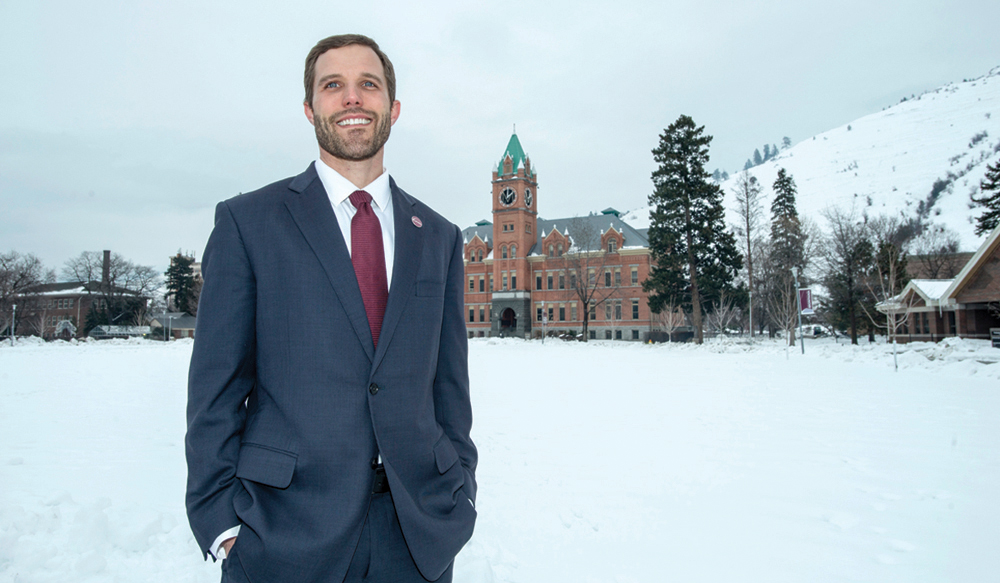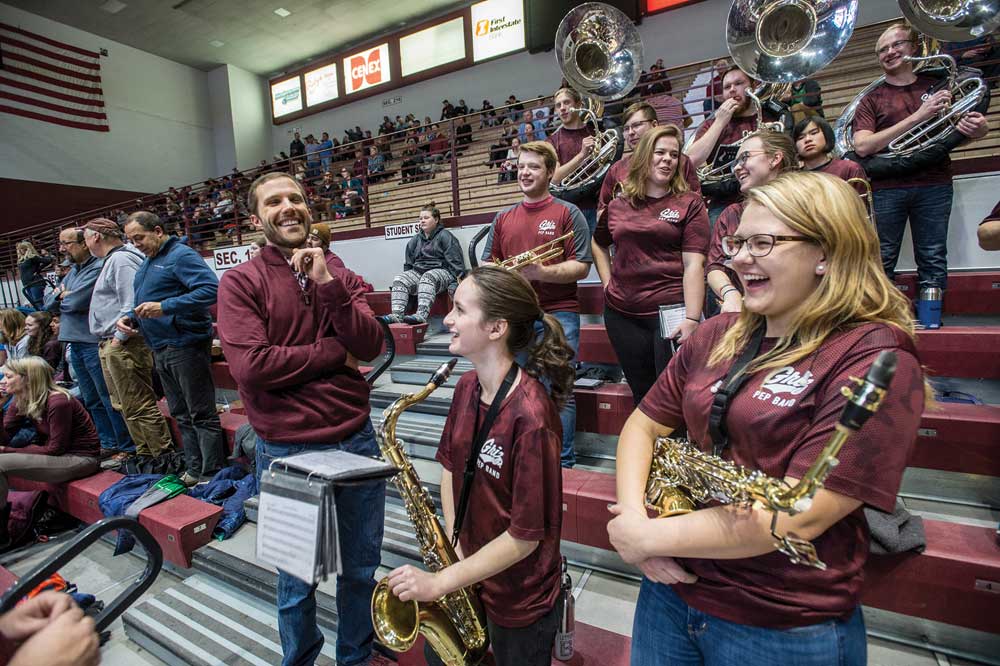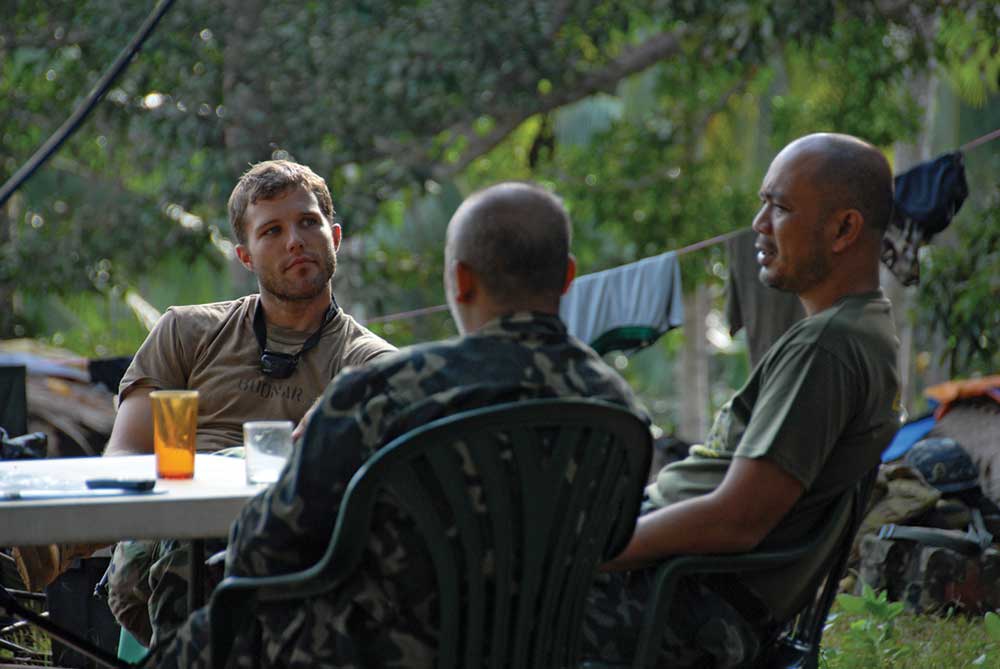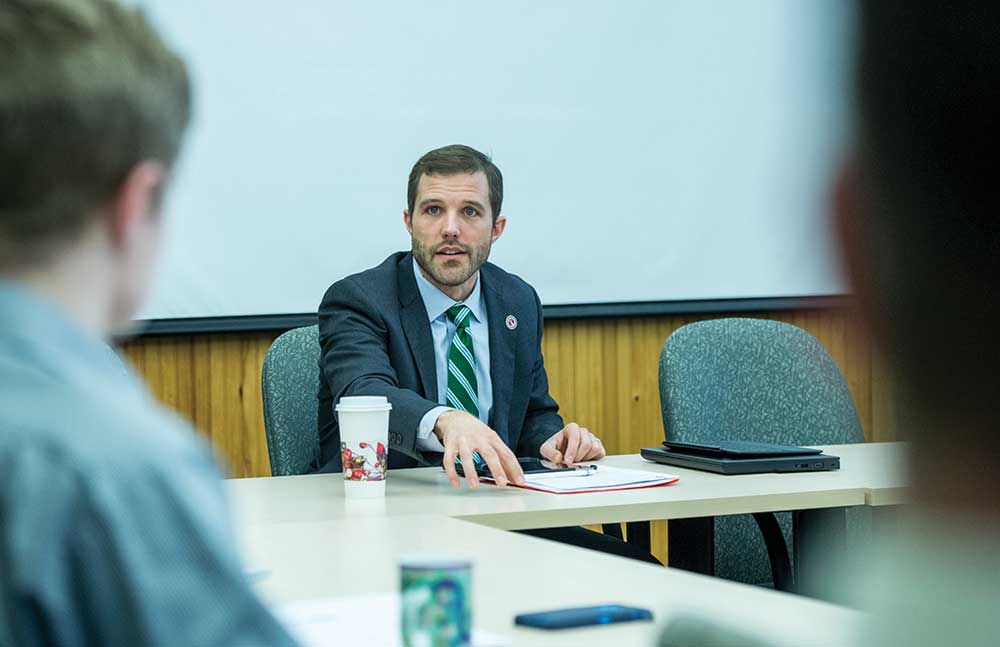- Editorial Offices
- 103 Brantly Hall
- Missoula, MT 59812
- (406) 243-2522
- themontanan@umontana.edu
Mission Accepted
New President Seth Bodnar brings passion for service and high achievement to UMPhotos





In a story about the first major turning point in his life, Seth Bodnar tells a humanizing aside.
In 1997, he earned a scholarship to the U.S. Military Academy at West Point, housed along the Hudson River in New York, some 350 miles east of the bituminous coal country where he was raised in a small western Pennsylvania town.
Though his grandfather had served in the Navy in World War II, his parents were career elementary educators, so he had no Army officers in his family to emulate. He was scared. Upon arrival he submitted to a routine tuberculosis test. Afterward, he called for divine intervention.
“I distinctly remember that night saying, ‘Oh God, please let me have TB, let me go back home,’” Bodnar says.
Perspective on how much he changed after that – and how fast – comes from a former director of the Central Intelligence Agency.
In 2003, David H. Petraeus was a major general with the 101st Airborne Division in Iraq. By that time, Bodnar, who graduated first in his class of 974 at West Point and was advised to become a Rhodes Scholar, was earning his second master’s degree in Oxford, England. Had Bodnar paced his studies in Oxford’s English Gothic classrooms and medieval pubs, he would have joined the 101st Airborne Division after it was sent home from Iraq, back to America.
Instead Bodnar rushed to finish so he could get to the Nineveh Province in Iraq and lead patrols near the Tigris River in the capital city of Mosul, a hotbed of conflict.
“He felt a strong duty to serve,” Petraeus says. “He had to guide the soldiers of his platoon in the conduct of a complex counterinsurgency campaign in a province with innumerable ethnic, sectarian, tribal, cultural and political elements – all vying for power and resources.”
Bodnar passed that tuberculosis test, by the way. Twenty years later he passed another test that also meant he would begin a new life with new and powerful responsibilities. He was selected in 2017, after a rigorous, nine-month search by a more-than-20-member committee, to become the new president of the University of Montana.
“To shape ethical citizens to guide this country, that is about as important a thing as you can be working on today,” Bodnar says. “It’s fundamentally important to the state of Montana and to the nation – the nation that I’ve served for a decade and a half of my life.”
He adds, “I’m inspired by this mission.”
At 38 years old, Bodnar, UM’s 19th president, is its youngest since 1945. He is a handsome, All-American guy – wholesome as apple pie – nevertheless hard-baked on the battlefield and in the corporate boardroom. In conversation he is thoughtful, inquisitive and fond of the verbs “foster,” “facilitate” and “drive” – often followed by the phrase “outcomes that matter.”
He comes to Montana from Chicago, where he worked for General Electric, and just before he was offered the UM job in October 2017, he rose to the rank of senior executive. He is, says those who have dealt with him, a ferociously hard worker who has earned his good fortune and leveraged it with savvy.
“Seth Bodnar asks very good questions, and lots of them,” says outgoing UM President Sheila M. Stearns, whom he succeeded. “He has an aura of inspirational confidence.”
Diana Six, a forestry professor who served on the presidential search committee, says she backed Bodnar because he impressed her as an “insanely intelligent” person whose mind is “nimble and visionary” and also possessed of great “humor and warmth.”
He was born in modest Grove City, Pennsylvania, the second child and first son of a mother who was a career elementary school teacher and a father who rose from teacher to superintendent of a school district. Though Bodnar says he lacked for nothing growing up, his parents weren’t rich. Having excelled in both academics and athletics in high school, he chose West Point because he was offered a good scholarship. He also was interested in becoming a leader.
“My parents taught me the importance of education to transform other people’s lives,” he says. “West Point introduced me to the idea of being a part of something that was bigger than me. It was transformative.”
While there he went on exchange to Uzbekistan and Kazakhstan, lettered in baseball and went on to become both a Truman Scholar and a Rhodes Scholar. While in Oxford in the early 2000s, he rode a bus to Cambridge one day and fell into a gin rummy game with another Rhodes Scholar who tied his fate inexorably to Montana. Her name was Chelsea Elander.
“I tell people I went all the way to England to meet an incredible woman from Montana,” says Bodnar, who married Elander in 2005.
In 2004, after helping stabilize Mosul during his first stint in Iraq, Bodnar visited Montana and was awestruck. He went to the tiny town of Absarokee to a working ranch that has been in Elander’s family for five generations. He marveled at the peaks of Glacier National Park. And he felt an immediate affinity for the town with the university at its heart where Elander was born and raised – Missoula.
“There’s an old saying: If you want a great city, build a great university and wait 125 years,” he says.
He returned to military service, became an elite Green Beret, learned Mandarin Chinese and for six months lived in a grass hut on a small island in the Philippines, where he trained local Marines to collaboratively fight off extremist insurgents. He returned to Iraq in 2008. The next year he went back to West Point and taught economics, a subject he earned degrees in because, he says, “at its core it was a study of the world and how people interact with each other.”
Wanting private-sector experience, he took a job with GE in 2011. Eventually he oversaw 1,500 employees in the company division that built locomotives. Sales were in a slump. But Bodnar led the installment of computer systems into new locomotives that automatically drove them based on precise calculations about train weight and track dynamics. Soon, trains were saving 900,000 gallons of diesel fuel per week. Locomotive sales ticked back up.
Though Bodnar was on course to one day earn an S&P 500 CEO’s median eight-figure salary, he and his wife, a pediatrician who graduated from Harvard, had begun longing for a way to make their next move to Montana.
“Throughout our relationship, we’ve always thought about how we could get back to Montana and contribute in a positive way,” he says. “When we thought about where we want to live, service to our community is always at the heart of what we want for our lives, and we’ve always talked about how we could make that community Montana.”
In early 2016, Bodnar started to seriously explore ways to make moving to Montana a reality, but unfinished work at GE kept him in Chicago. Less than a year later, he was among four finalists in the running for UM’s presidency. In November 2017, days after GE’s CEO announced plans to bow to shareholder pressure and sell off the locomotive division, Bodnar accepted the formal offer to become UM’s newest president.
A theme that has run through Bodnar’s career – from Iraq to the Philippines to the locomotive division at GE – is that he has gone into fractious environments, identified points of strength and used those resources to improve stability, cooperation and better movement down the right tracks.
It seems perfect preparation for UM.
Some of his great challenges are clear. Enrollment is down around 25 percent from 2010. The community also is still healing from the spate of sexual assault allegations that resulted in a rape conviction of a UM student in 2012.
Bodnar will assume responsibility for a review process called Academic Program and Administrative Services Prioritization. Bodnar says he believes he can listen well and be transparent in his deliberations, as well as elucidate from the UM community a “shared vision” of where the University needs to go and what it needs to do to get there. One of the greatest resources he has found is the passion people have for UM.
“My job is really to get in there and channel the collective energy of this community,” he says. “When you can show people clear strategy, the decisions that have to be made make sense. It doesn’t make them easy, but it makes sense in the face of a strategy that we’ve collectively developed.”
As he does it, Bodnar says he is most excited to simply plant his feet on the Oval grass and mix it up with students. He wants to hear from them on hikes to the M, over meals and mugs of coffee, and on basketball courts.
“I love being around students who are learning, who are growing, who are stretching themselves,” he says.
His youth and peripatetic resume beg the question, however: How much time will he actually spend at UM? Will his tenure be like that of George Dennison, president from 1990 through 2010, the longest in UM history? Or more like Edwin Boone Craighead, president from 1912 to 1915, the shortest in UM history (not counting interim president Frederick Charles Scheuch, 1915-17, and Stearns, 2016-17)?
John DeBoer, an associate professor at UM’s School of Theatre & Dance and member of the presidential search committee, has only speculation.
“I hope he stays for as long as it takes to do right by us,” DeBoer says. “And then, if I have to vote for him for governor or president, I’ll do that, too.”
Bodnar, while still enigmatic, offered more concrete clues. He put his family’s house in Chicago up for sale. He enrolled his twin 7-year-old son and daughter in second grade at Missoula’s Paxson Elementary School. He said he hopes that eventually all three of his young kids, like their mother, graduate from nearby Hellgate High School.
“This is not, for me, a stepping stone to anything else,” he says. “This, for me, is a job I want to see through, and when I’m no longer the right person to do that, I’ll know when it’s right to step aside.”




